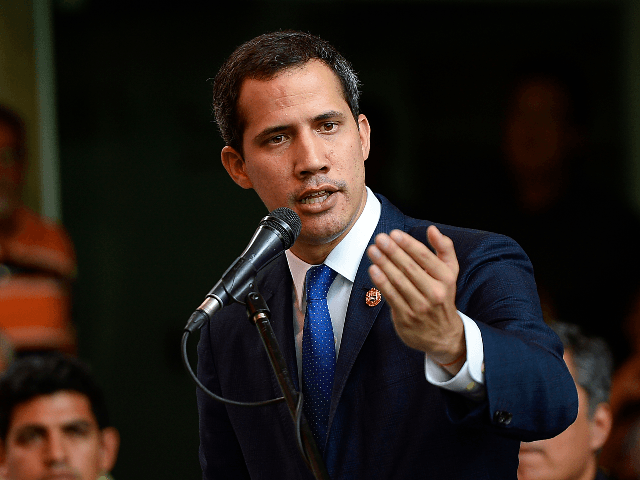Venezuelan President Juan Guaidó continued a world tour banned by the socialist Maduro regime and landed in Canada on Sunday, where he has a scheduled meeting with leftist Prime Minister Justin Trudeau.
According to Trudeau’s office, the president will discuss with Trudeau “the importance of democracy & the need for a peaceful, Venezuelan-led transition towards free & fair elections as soon as possible.
Guaidó has at press time met with Trudeau’s Foreign Minister François-Philippe Champagne and will soon meet Trudeau. His efforts in Canada are part of a larger world tour in which he first met with American Secretary of State Mike Pompeo in Colombia, then headed to Europe to secure support from leaders in Spain, France, and the United Kingdom.
Guaidó is the president of Venezuela, and constitutionally assumed the position in January 2018 after the expiration of Nicolás Maduro’s term as president. Maduro has refused to leave power, claiming he is still president based on a highly fraudulent election in May 2017. The Venezuelan National Assembly, the last democratic institution in the country standing, appointed Guaidó interim president as the Venezuelan constitution requires, tasking him with the responsibility of organizing free and fair elections to replace Maduro. As Maduro still controls the military, Guaidó has failed to oust him and has little ability to exercise his legitimate powers.
Trudeau, whose left-wing administration has close ties to the Cuban government – which subsidizes and largely administers Venezuela on Maduro’s part –announced his discussion with Guaidó on Twitter.
“Tomorrow we will meet to coordinate and take joint actions for freedom,” Guaido said in response, thanking Trudeau. “We have the opportunity to together recover democracy in Venezuela and consolidate the security of our continent.”
Canada recognized Guaidó as the legitimate president of Venezuela, as do most nations in the Western Hemisphere. About 50 countries recognize Guaidó nationwide; Maduro allies like Russia, China, and Iran do not, while many nations simply have not made a statement either way.
The Prime Minister’s Office issued a statement on Guaidó’s visit in which it reiterated that Canada recognizes Guaidó’s presidency. It also noted that Canada has joined the United States in imposing sanctions on dozens of Maduro regime officials.
“Canada has pledged its steadfast support for Interim President Juan Guaidó of Venezuela and has called for a peaceful, Venezuelan-led transition toward free and fair elections as soon as possible,” the statement read.
The statement also featured a remark from Trudeau himself, applauding Guaidó.
”I commend Interim President Guaidó for the courage and leadership he has shown in his efforts to return democracy to Venezuela, and I offer Canada’s continued support. Canadians stand with the people of Venezuela in their pursuit of free and fair elections and basic human rights,” Trudeau said.
During his meeting with Guaidó, Foreign Minister Champagne called it “an enormous honor” for Canada to be a stop on Guaidó’s tour. Guaidó reportedly discussed the human rights of the at least 400 known political prisoners Maduro is holding captive and his imminent return to Venezuela, where Maduro could potentially move to arrest him. Despite having no official power, Maduro imposed a travel ban on Guaidó last year, which he thwarted crossing the border into Colombia. Guaidó did not risk going through a Venezuelan airport and Maduro-obeying security there.
“We worked to take joint actions to rescue human dignity in Venezuela, which is being assaulted by the dictatorship, and recover Democracy and Freedom,” Guaidó said of his meeting with the top diplomat.
Neither party offered specifics on what joint measures they would take to help restore freedom or remove Maduro.
Guaidó exited Venezuela to galvanize international support for his presidency following a turbulent start to the year in Caracas for him. As the year began and the National Assembly prepared to re-elect him as legislative president, his title before assuming the interim presidency, Maduro deployed Bolivarian National Guard troops to block Guaidó from entering his own office. Guaidó initially tried to shove his way through fully-equipped riot police in only a suit, easily expelled from outside the National Assembly headquarters. In the meantime, and alleged member of the opposition, Luis Parra, attempted to swear himself in as legislative president. On the second day of such turmoil, Guaidó succeeded in climbing over the bodies of National Guard troops with the help of a much larger crowd who assembled to prevent Maduro’s armed men from blocking Guaidó.
Guaidó retained his National Assembly presidency and shortly thereafter traveled to Colombia, where he met with Pompeo.
“For the Venezuelan people, I want you to know that your President is a great leader who wants to take your country in the right direction – the direction of freedom, democracy, to restore economic prosperity,” Pompeo told reporters during his meeting with the Venezuelan head of state. “You should know that countries across the world – in Latin America where we are today, in Colombia, in Europe, the United States, all across North America – the people, the democratic people of those countries are with you.”

COMMENTS
Please let us know if you're having issues with commenting.